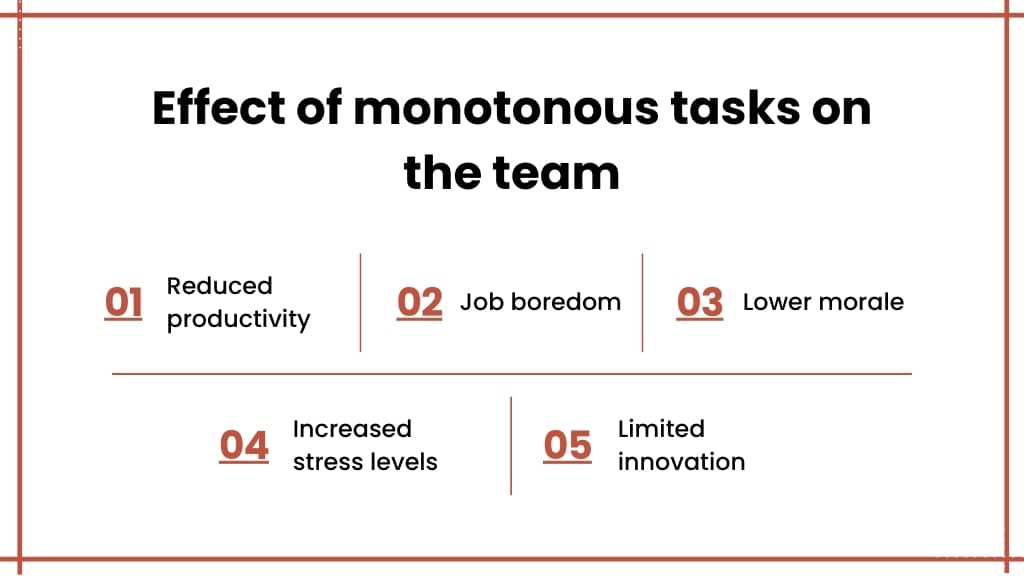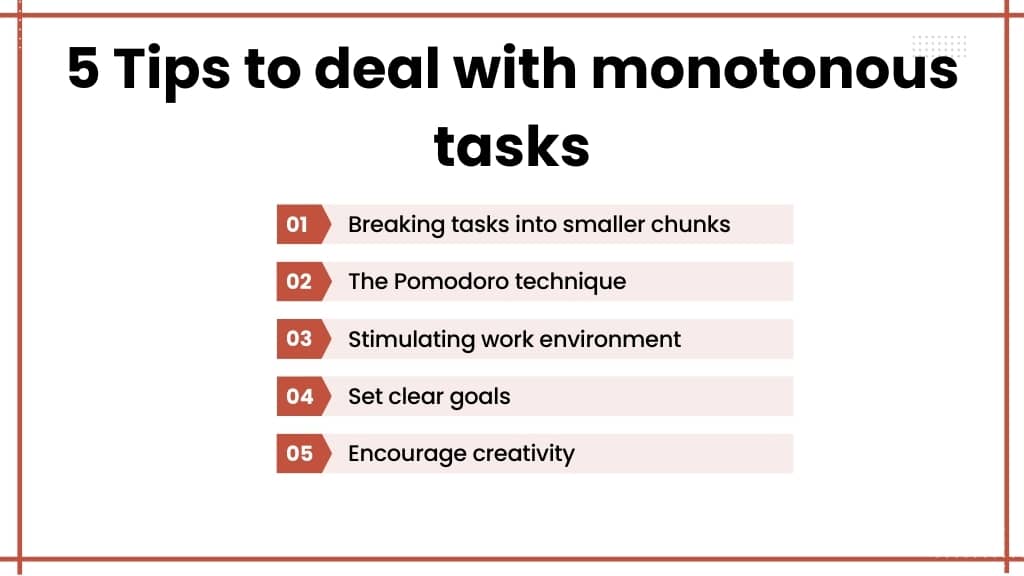Introduction
Looking at the current evolving business landscape, it has become almost certain that every team has repetitive tasks. These tasks are quite important in maintaining order but often lead to disengagement and reduced team morale.
What is a manager supposed to do then? How do you maintain the enthusiasm and productivity of those in the team at the workplace when the routine seems to be monotonous?
Dealing with monotony will never be as simple as adding a little flavor to the workday—it is about motivating the team and increasing work engagement. Happy employees translate to more motivated employees, which leads to improved productivity that has a direct bearing on your organization’s performance.
As a manager, you are responsible for finding strategies for overcoming the negative effects of repetitive tasks while making the work environment exciting and fulfilling.
This blog has brought you five practical tips to make your team deal with monotonous tasks. From developing an effective work environment to enhancement of team motivation, we will cover every aspect to eliminate repetitive tasks. Let’s get started…
Read more: Top 10 Ways to Avoid Getting Bored of Being a Project Manager
Effect of monotonous tasks on the team
Monotonous tasks are an unavoidable aspect of many jobs, but when it comes to assessing their effects on your team, it is profound and far-reaching. A study by Jake Jorgovan highlights a critical issue where only 28% of employees feel connected to their company’s vision when they are engaged in repetitive tasks.
While other employees confront these challenges:

1. Reduced productivity
When employees are stuck in repetitive tasks, they feel less motivated. This lack of engagement results in decreased interest and diminished effort, which causes a decline in productivity resulting in reduced interest. It affects employees’ ability to perform at their best, ultimately impacting their overall efficiency.
2. Damaged mental health
Monotonous tasks can lead to boredom and negative emotions. This not only creates work burnout early but also gives rise to mental health issues such as stress and even depression.
3. Lower morale
When work becomes repetitive, employees feel that they are not growing or developing new skills. The lack of variety prevents them from engaging in more stimulating tasks that could boost their job satisfaction and overall enthusiasm for their work. This can lead to a decrease in work morale and reduce creativity.
4. Increased stress levels
Industrial psychologists found that repetitive tasks require more effort and sustainable attention than complex tasks. The constant need for sustained attention on the same type of task can increase stress and mental fatigue. The pressure of maintaining the same level of concentration increases stress and mental fatigue.
5. Limited innovation
Performing the same task on a regular basis affects creativity and innovation as employees become so accustomed to their routines that they fail to explore new methods or solutions. This lack of creative thinking prevents team members from reaching their full potential and affects organizational growth.
Also read: How to fall in love with your job (again)?
5 Tips to deal with monotonous tasks
Monotonous tasks can be a significant reason for a drain in productivity. To deal with it better, here are some tips to follow:

1. Breaking tasks into smaller chunks
Sorting the tasks into smaller segments lets the team have a clear vision to complete each one of them sequentially. It creates a sense of progress, which prevents having the burden of tasks. This approach makes work less daunting and more engaging for the team. Moreover, breaking tasks into chunks allows team members to plan their breaks to maintain cognitive engagement with work.
You can also take help from task automation software, which can help you plan and create blocks of a big project, to let your team deal with task monotony.
2 . The Pomodoro technique
The Pomodoro technique involves working in focused 25-minute intervals, followed by a short break. This technique is good for improving concentration and preventing burnout. After completing four intervals, employees can take a longer break, which helps maintain high levels of productivity and prevents fatigue.
3. Create a stimulating environment
Providing a change in environment makes monotonous tasks more enjoyable and bearable. Merely allowing employees to listen to music while they are working does wonders in elevating their mood and improving focus. Music also helps block out distractions, allowing employees to completely focus on their work.
4. Set clear goals
Clear, achievable daily goals provide direction and motivation. Regular reviewing goals helps employees stay focused and motivated as they achieve their objectives. Must Ensure that these goals are realistic to avoid frustration and demotivation among team members.
5. Encourage creativity
Routine work will always be monotonous. Encourage team members to find innovative ways to complete their tasks or to suggest improvements. This will encourage them to work more dedicatedly and interestingly while also working in sync with the goals of an organization.
Explore more: Strategies for Maintaining Work-Life Balance in the Workplace
Conclusion
In conclusion, repetitive work seems to be very common in the workplace and prevents employees from being highly productive, motivated, and psychologically balanced. Implementing such strategies not only benefits the employees and their performance but also lets team members try something new in their daily work routine. Therefore, the prevention of a boring and demotivating way of performing a repetitive task is important in a manner to an enthusiastic team about their job.
FAQs
Why is it important to address monotonous tasks in the workplace?
Monotonous tasks lead to a reduction in productivity, less employee morale, a decrease in motivation, and others. It creates the risk of errors and produces quality work.
What are some best examples of monotonous work?
Data entry, inventory management, customer emailing, and administrative tasks are the best examples of tedious work.
How to motivate a team to do monotonous tasks?
You can divide extensive tasks into blocks. Motivate your team and provide timely training and support.




























No Comments